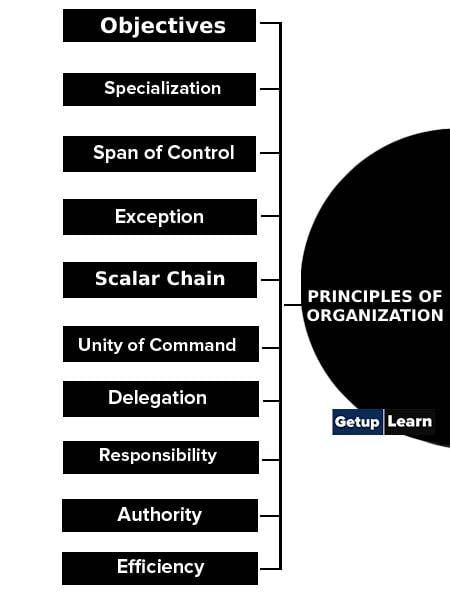Table of Contents
Principles of Organization
The organization is a structure with people occupying positions with authority to work for the achievement of organizational objectives. In order to develop an effective organizational structure, certain guidelines are necessary to tag along into the system.
E. F. L. Brech explained, “If there is to be a systematic approach to the formulation of organization structure, there ought to be a body of accepted principles”.
Let’s discuss some important principles of organization explained below:
- Objectives
- Specialization
- Span of Control
- Scalar Chain
- Unity of Command
- Unity of Direction
- Delegation of Authority and Responsibility
- Efficiency
- Simplicity
- Flexibility
- Acceptability

Objectives
The objectives of the enterprise and the organization structure are closely related and dependent on each other.
Hence, the objectives of the enterprise should be clearly defined first and then the process of accelerating the resources of the organization should be started for the achievement of these objectives.
Specialization
Effective organizations need every job to be performed in the best manner. This leads to promoting specialization i.e. every job should be performed by an expert person.
Therefore, the activities of the enterprises should be divided into small jobs and assigned to persons according to their specialization.
Span of Control
The span of control means the span of the number of employees under one supervisor. Hence, the span of control brings effectiveness to the job, which is the foremost requirement.
Therefore the span of control must be kept low in order to bring effectiveness to the organization. A supervisor should be asked to supervise a reasonable number of subordinates.
Scalar Chain
The scalar chain means that the communication channel should be bi-directional. The policy, objectives, procedures, guidelines, and instructions should flow from top to bottom. The feedback, grievance, and suggestions must go to the top from the bottom. There should be a specific provision in organization structure and design
Unity of Command
Other principles of organization are unity command. There should be unity in command. It means that the employee must seek command from one person. There should not be two supervisors for one job. There should be unity in the command issued at the appropriate level.
Unity of Direction
There should be unity in a direction issued for the same or similar types of jobs. It also indicates that in the case of strategic business units, the direction may come from more than one person, but there should be unity in all the directions issued from different persons.
When the work is divided into jobs and assigned to different people, it becomes necessary to take decisions at right time. Hence they should be delegated appropriate authority in order to do the job.
The authority always brings accountability which, in turn, seeks responsibility from the person. Hence the authority must be given to the person who seems to be responsible.
Efficiency
The work division should be done keeping in view the efficiency of the system. This means the organization structure should be efficient enough to make justice to the organizational objectives.
Simplicity
This principle organization is important because the complex system very often face problem with delivery. Hence the organization structure should be simple in nature.
Flexibility
As the planning depends on the forecasting of premises, it necessitates the planning to be flexible enough to accommodate future change. The organization structure also needs to be flexible enough to accommodate the future change in business conditions.
Acceptability
The acceptability of the structure is equally important. The acceptability of policy, procedure, rules, and regulations along with people’s acceptability is a must for any organization. If the system is ready to accept it then the process of organizing becomes smooth.
What are the principles of organization?
The following are the principles of organization:
1. Objectives
2. Specialization
3. Span of Control
4. Scalar Chain
5. Unity of Command
6. Unity of Direction
7. Delegation of Authority and Responsibility
8. Efficiency
9. Simplicity
10. Flexibility
11. Acceptability.

















